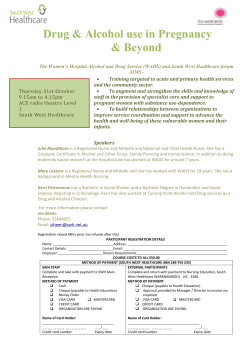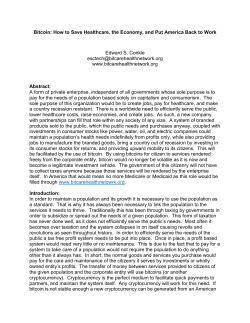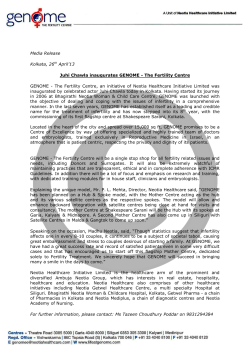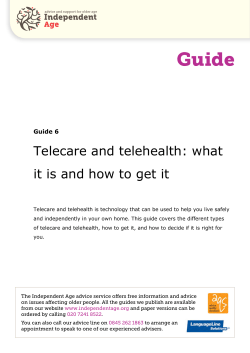
Integration of Health Services: How to be Patient Centred
83 Victoria Street, London SW1H OHW T 0203 1707 702 E admin@2020health.org Learning Lunch on Integration of Health Services: How to be Patient Centred with Charlie Elphicke MP and speakers Dr. Geraint Lewis, Senior Fellow, Nuffield Trust Sue Roberts CBE, Clinical Lead, Year of Care Programme Phil Molyneux, Chief Information Officer, NHS Yorkshire and Humber at the Centre for Social Justice th 17 November 2011, 12.30pm-2.00pm Key Action Points Put the patient at the heart of the process: Inform patients - mail them the information with an explanation, then book an appointment two weeks later so that when they come in, they are equipped to collaborate in their own care Create a space where patients can record their personal health plans/goals so that they can discuss these with their doctor Publish data to provide comparative benchmarking between regions/hospitals which will o force hospitals to compete for the best reputation o allow patients to make an informed choice about which provider Facilitate information exchange: Providers should only be reimbursed when they provide the patient information in a usable format to support joined up care Develop common standards for interoperability and information sharing IT systems at a basic level Introductory Comments Broad considerations for the integration of health services: Integration is the left hand knowing what the right hand is doing All levels (primary, secondary, etc.) need to work together on a clear path of care 83 Victoria Street, London SW1H OHW T 0203 1707 702 E admin@2020health.org IT integration means functionally everyone being able to read and write on the same set of medical records Clinicians need to drive the change from the bottom up At the heart of successful integration is a shift in cultural perception towards patient-centred rather than paternalism What can be done to promote integration of services? Lessons from abroad o A single “cloud”-based open source medical record system such as the one used in the USA Veteran’s Association can provide nation-wide integration for all levels of care (e.g. Jordan) o Telehealth can enable a clinical team to continue to manage a patient after they have been discharged from hospital, which can prevent readmission (e.g. Toronto, Canada post-discharge virtual ward) o “Physician triage” similar to Kaiser Permanente’s 23 hour clinics can reduce hospital admissions Lessons from the Year of Care Programme (with respect to diabetes) o GP visits should be used effectively to provide patients with long term conditions the information to support self care, which patients are already doing 99% of the time. o Care planning should be a collaborative exercise between the doctor and the patient o The patient needs access to and explanation of their own medical information in order to make informed choices (example: you cannot manage your own finances if you don’t know what is in your bank account!) Lessons from the demise of the National Programme for IT o It is not necessary to institute a single IT system to achieve integration o It is possible to make better use of the technology that we already have o There should be a focus on sharing information and developing common standards for systems at a basic level o It’s important to look at what the patient needs are when designing an IT system Discussion What exactly are we asking for when we talk about integration? This is difficult to answer as it is different for different sectors. It should be considered a spectrum, with each sector having different needs for information access. How do we start the journey? Each sector tends to be silo’d so it’s a big cultural change, but everyone must get on board. 83 Victoria Street, London SW1H OHW T 0203 1707 702 E admin@2020health.org It’s possible to just start publishing data on institutions so that people can make informed choices about which provider. It’s not necessary to have a complicated IT system - just set a standard so that there can be a basis for communication. How can we get patients involved in their own care? The patient needs access to information to make a choice, not just which provider, but between actual treatment options, which means knowledge. We should work towards electronic health records which provide patient access and allow you to record your personal health plans/goals. A very effective way to encourage patient self-management is through telehealth. Do we really need to spend more on IT, and is open source the way forward? The more you spend on quality IT the more you save in the long run. Open source provides potential for unlocking ownership over IT and saving money. It’s all about functionality - the structural issues (open source vs. brand, single system vs. multiple) are secondary. IT is not necessarily the solution, or more money – it’s about a shift in our way of thinking. (Illustration: in Brazil they have “integrated” all major governmental service providers such as water, power, healthcare and voter registration by physically placing them in the same building – no complicated IT required). What are the implications of any qualified provider? If the incentives are aligned, then everyone will be incentivised to buy in. Providers should only be paid if they deliver information in the right format to support joined-up care across organisations. In the new CCG commissioning system, GPs are unlikely to tolerate any lack of information, and so will simply not sign off payments if the providers have not given them the information. What are the key barriers to change? There needs to be a focus on primary care and clinical leadership. IT system needs sorting out – the exchange of information is the main aspect of integration. Consistency and continuity are the most fundamental, and if you get that right, it will enable you to get the information that you want. 83 Victoria Street, London SW1H OHW T 0203 1707 702 E admin@2020health.org Differing levels of health literacy may widen social inequality because some people will be able to make best use of the system but others won’t. How do we remove these barriers? There should be comparative benchmarking between regions/hospitals that are made public, which will force hospitals to compete for the best reputation. Patients must be educated and empowered to self care. But to truly make that cultural change, health providers must be educated too. 2020health further thoughts The Veteran Health Administration in the US provides an excellent model in terms of patient-centred care, with a universal electronic health record to which patients have access, and a large scale programme on telehealth based around a care coordination model. This transformation came about in the mid-1990s when the organisation was challenged to change or be closed down. Attendees Charlie Elphicke MP (Chairman) Member of Parliament for the Dover constituency House of Commons Dr. Geraint Lewis (speaker) Senior Fellow Nuffield Trust Sue Roberts CBE (speaker) Clinical Lead Year of Care Programme Phil Molyneux (speaker) Chief Information Officer NHS Yorkshire and Humber Sarah Richardson Director Edelman Hannah Cameron Associate Director Political Intelligence Audrey Yvernault Consultant Campbell Gentry Graham Kendall Chief Executive Officer Graham Kendall Consulting Jennifer White Account Manager Helen Johnson Consulting Limited 83 Victoria Street, London SW1H OHW T 0203 1707 702 E admin@2020health.org Jane Bunnett Chief Executive Officer Glencare Colin Cooper Editor in Chief, Head of Content Haymarket Medical Media Glen Griffiths Patient eHealth/ Digital Healthcare specialist Independent Consultant Geoff Frew Managing Director PharmaTimes Penny Woods Chief Executive Officer Picker Institute Europe Dr. David Cox Programme Manager , Integrated Care and Interventional Public Health Imperial College Healthcare NHS Trust Matt James Chief Executive Private Hospitals Alliance Jenny Shand Director of Integrated Care UCL Partners Barbara Arzymanow Director True Research Rita Davies Governor North East London Foundation Trust Janet Kiddle Founder Steel Magnolia Brain Hargreaves Senior Advisor- Healthcare 3i plc Jeremy Nettle Director, Global Client Advisor for Healthcare Oracle Suzi Miller Consultant Board Intelligence John Johnston Medical Assessor The Medicines and Healthcare products Regulatory Agency Hannah Gagen Government and public affairs Boehringer Ingelheim Ltd James Philips Director Glen Care Group Nick Bason Head of Policy and Public Affairs Bowel Cancer UK James Hewitt Government Affairs Manager National Rheumatoid Arthritis Society Anita Randon Director Capita Group 83 Victoria Street, London SW1H OHW T 0203 1707 702 E admin@2020health.org Dr. John Chisholm CBE Director Concordia Health Limited Dr. Carole Easton Deputy Chief Executive Changing Faces Angela Single Clinical SME – Telehealth BT Global Services Director Black Mental Health UK Professor David Croisdale-Appleby OBE Chair, Honorary professor NICE Programme Development Group, School of Medicine & Health at Durham University Laura Clarke Assistant Policy Adviser RCN Policy and International Julia Manning Chief Executive 2020health.org Gail Beer Consultant Director 2020health.org Dr Jonathan Shapiro Senior lecturer in health services research University of Birmingham John Cruickshank Consultant Director 2020health.org Dr Samantha Gan Researcher 2020health.org Gemma McGeachie Matilda MacAttram
© Copyright 2025



















